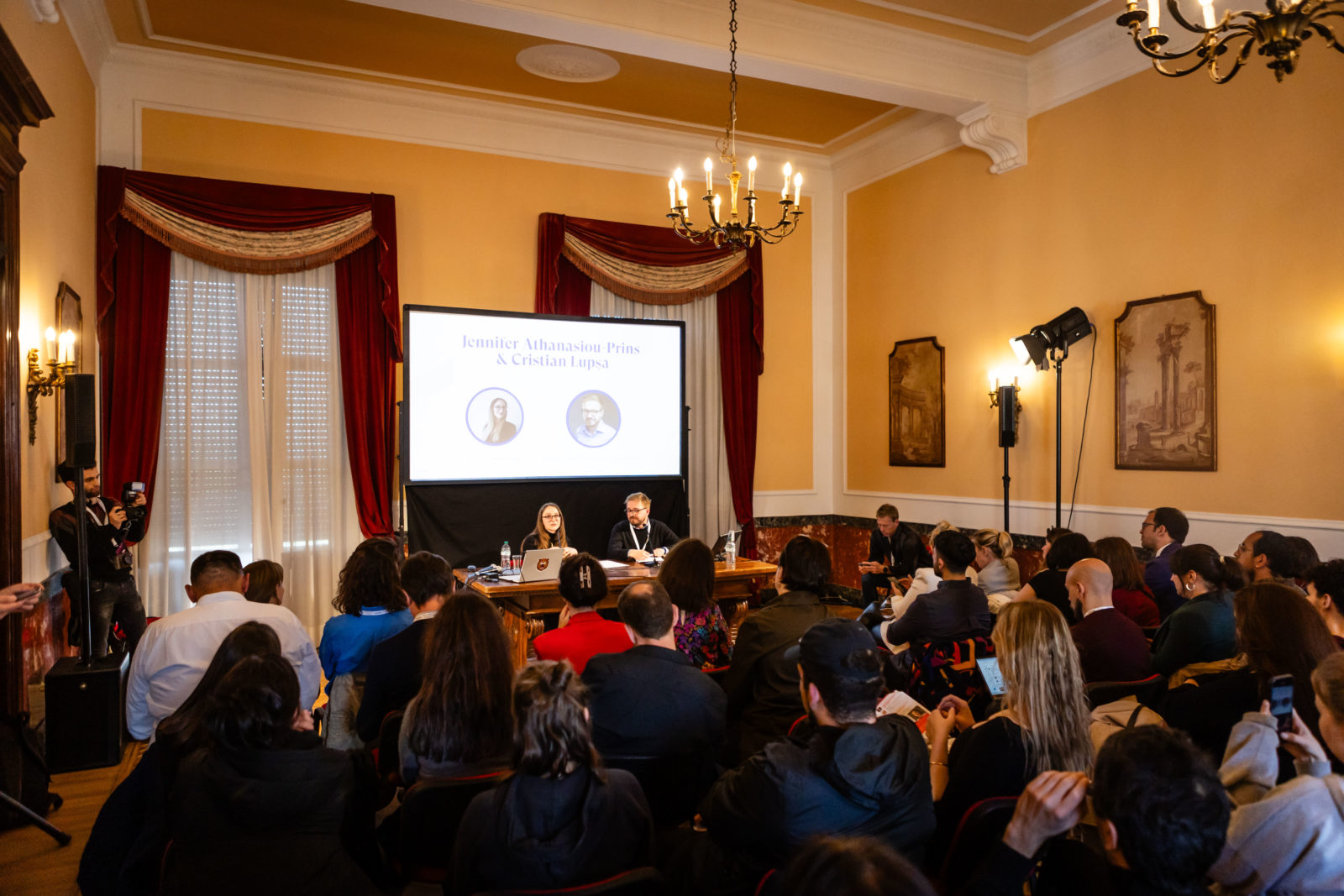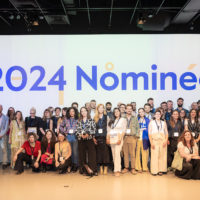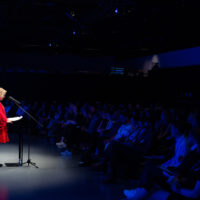The Shortlist of the European Press Prize 2024
For this edition of the European Press Prize – the 12th – we received almost 800 submissions from over 40 European countries, originally published in 35 different languages. From them, the Preparatory Committee selected 25 projects for the 2024 Shortlist, divided into five categories.
The Shortlist of the European Press Prize reflects the main themes and issues that interested and affected Europe(ans) in the past year, and offers insights into the times to come. The topic of war is strongly present, but investigations into powerful and wealthy individuals, articles that tackle cases of abuse, and the consequences of migratory movements are also featured in the Shortlist.
For example, in Where the World Splits Apart, shortlisted for the Distinguished Reporting category, Henning Sussebach travels along the Russian border, from Norway to Georgia, to tell the stories of different societies and how they are affected by the Ukrainian invasion. The Missing Daughters of the South Caucasus, shortlisted for the Public Discourse Award, brings us to Armenia, where every year more than a thousand girls are prevented from being born, for an ancient form of discrimination. Shortlisted for the Investigative Reporting category are instead, amongst others, The Rotenberg Files, which show us how the Rotenberg brothers, oligarchs, and childhood friends of Vladimir Putin, handle their wealth to avoid the sanctions coming from the West.
This year, the Investigative Reporting category list is made up of projects done or initiated in Southern and Eastern Europe, showcasing the diversity of voices and outlets that make up the list.
Cristian Lupsa, Chair of the Preparatory Committee of the European Press Prize, explains: “We all read hundreds of stories, came together to debate, to gain perspective, and, as a group, to put forth a list of what we consider the most excellent journalism of the year. For us, that means recognizing a wide scope of work, from small newsrooms with little resources to large players with a strong pedigree. It’s our conversations and openness that make this process possible, and I’m thankful for this.”
Topics of abuse and mental health strongly represented
Several of the shortlisted articles of this year’s edition of the Prize deal with the topic of abuse, either physical or mental, and with the consequences of it.
Among the pieces that tackle such issues are, for example, Women on the Run From Abusers Face Being Returned From Denmark to Syria, which deals with the fate of female refugees, sometimes survivors of domestic violence, and the Danish immigration system.
In “How Am I Going To Ask a Hospital for Help if the Abuse Happens in the Hospital?”: Sexual Violence in Hospitals and Doctor’s Offices the authors investigate sexual abuse in hospitals across Portugal. They discover that situations of mistreatment, verbal and sexual abuse, and rape are frequent.
TikTok’s Muscle Power tells us instead of another type of mental issues, caused by the damaging effects of this social media on a teenager who falls deep into a hyper-training rabbit hole.
Announced in Perugia, during the International Journalism Festival
This year’s Shortlist was announced during the International Journalism Festival in Perugia, the event that brings together journalists, activists, and experts in the field of media from all over the world every year.
The announcement took place during the second half of a panel organised by the European Press Prize – titled ‘European Press Prize in Conversation’ – part of the official collaboration between the Prize and the Festival.

Executive Director Jennifer Athanasiou-Prins and PrepCom Chair Cristian Lupsa during our panel “European Press Prize in conversation”
Jennifer Athanasiou-Prins, Executive Director of the European Press Prize: “An important part of the European Press Prize’s mission is encouraging journalists to keep holding power to account, by being a source of pride and validation. Announcing our 2024 Shortlist at one of the biggest journalistic events in Europe fits in perfectly with that part of our mission. The IJF Perugia is a very fitting festival to celebrate the best of European journalism, together with so many journalists and media professionals – both from the Prize’s Community and beyond.”
(Watch the recording of the panel below)
Journalism: more and more a collaborative endeavour
Of the 25 projects that compose this year’s Shortlist, sixteen are collaborations between multiple journalists or outlets, whether from different countries or not.
Cristian Lupsa: “When resources are scarce, and the stories complex, collaboration is vital to creating journalism that serves the public interest. Cross-border investigations have been important for years, especially to track organised crime, money laundering schemes, and other violations. They have been joined recently by other types of collaborations: between outlets from various countries putting together pieces of a larger story – and migration is a prime example, but also between small and large players in the same country that join forces to create more relevant projects on healthcare, consumer safety, education and so on.”
THE EUROPEAN PRESS PRIZE
2024 SHORTLIST
For the full list of contributors per project, view the shortlisted projects on here.
THE DISTINGUISHED REPORTING AWARD
Four Hundred Boys Came Into Contact With Sweden’s Celebrated Foster Father – Several Tell of Abuse, by Björn af Kleen, Sofia Nahringbauer, published by Dagens Nyheter (Sweden)
Kazakhstan-Xinjiang, the Border of Tears, by Léa Polverini, Robin Tutenges, published by Slate.fr (France)
One Night in Bakhmut: Civilians Wait for the End as Russia Draws Closer, by Francis Farrell, published by The Kyiv Independent (Ukraine)
We Still Live: What Is Life Like in Russian-Occupied Mariupol? by Hessel von Piekartz, Erik Verwiel, Titus Knegtel, Joris Heijkant, published by De Volkskrant (the Netherlands)
Where the World Splits Apart, by Henning Sussebach, published by Die Zeit (Germany)
THE INNOVATION AWARD
In collaboration with the European Data Journalism Network, the 2024 Innovation Award focuses on work that uses Data Journalism in innovative ways, either in the journalistic process or in the final publication. Of course, as is true each year: all innovative projects were welcomed in this category.
18 Days Spent Phoning Every Half an Hour in the Hope That Someone Would Answer the Minimum Living Wage Helpline, by Eva Belmonte, David Cabo, Carmen Torrecillas, Adrián Maqueda, published by Civio (Spain)
Lapdogs of War: A Guide to Russia’s Wartime Oligarchs, by Vitaly Soldatskikh, Ekaterina Reznikova, Roman Badanin, Katya Arenina, Boris Dubakh, published by Proekt (Russia)
The Sound of Bullets: The Killing of Colombian Journalist Abelardo Liz, by Carlos Gonzales, Natalia Arena Chaves, Tania Tapia Jáuregui, Diego Forero, published by Bellingcat (International), Cerosetenta (Colombia)
The Stolen Treasures – The 110,000 Artifacts From Ukraine Found in Two Russian Museums, by Inna Gadzynska, Nadia Romanenko, Nadia Kelm, Yevheniia Drozdova, published by Texty.org.ua (Ukraine)
TikTok’s Muscle Power, by Christian Nicolai Bjørke, Henrik Bøe, Caroline Utti, published by Norwegian Broadcasting Corporation (Norway)
THE INVESTIGATIVE REPORTING AWARD
“How Am I Going To Ask a Hospital for Help if the Abuse Happens in the Hospital?”: Sexual Violence in Hospitals and Doctor’s Offices, by Cláudia Marques Santos, Ana Patrícia Silva, published by Setenta e Quatro (Portugal), Público (Portugal), The Pulitzer Center (International)
Iraq Without Water: The Cost of Oil to Italy, by Sara Manisera, Daniela Sala, published by Irpi Media (Italy), The Guardian (United Kingdom), Alternatives Economiques (France), Geographical Magazine (United Kingdom)
The EU Fight Against Child Pornography Stokes Fears of Widespread Online Surveillance, by Apostolis Fotiadis, Ludek Stavinoha, Giacomo Zandonini, published by Le Monde (France), Balkan Insight (Serbia), El Diario (Spain), Solomon (Greece), Die Zeit (Germany), De Groene Amsterdammer (the Netherlands), Netzpolitik (Germany), IrpiMedia (Italy), Domani (Italy)
The Rotenberg Files, by Cecilia Anesi, Raffaele Angius, Ludovico Tallarita, Roman Anin, Daniel Balint-Kurti, Lorenzo Bagnoli, Antonio Baquero, Christian Brönnimann, Luc Caregari, Šarūnas Černiauskas, Ben Cowdock, Jan Daalder, Tom Bolsius, Robert Denis, Lara Dihmis, Irina Dolinina, Alex Dziadosz, Abdelhak El Idrissi, Jared Ferrie, Brian Fitzpatrick, Misha Gagarin, Kevin G. Hall, George Greenwood, Jyri Hänninen, Caroline Henshaw, Nacho Herrero, Carina Huppertz, Sanita Jemberga, Peter Jones, Will Jordan, Minna Knus-Galan, Ilya Lozovsky, Alesya Marokhovskaya, Frederik Obermaier, Bastian Obermayer, Miranda Patrucic, Hugo Rasch, Maria Retter, Manuel Rico, Roman Romanovskiy, Holger Roonemaa, Sana Sbouai, Fabian Schmid, Timo Schober, Ekaterina Selivanova, Karina Shedrofsky, Maxim Solius, Inga Springe, Graham Stack, Tom Stocks, Drew Sullivan, Ludovico Tallarita, Tatiana Tkachenko, Giacomo Tognini, Elizaveta Tsybulina, Dmitry Velikovsky, Julia Wallace, Maria Zholobova, Oliver Zihlmann, Oksana Stavniichuk, Jan Strozyk, Eric Barrett, Birgit Brauer, Sergiu Ipatii, Olena LaFoy, Dima Stoianov, Charlie Turner, Alyona Korolyova, James O’Brien, Edin Pašović, Katie McCraw, Mark Nightingale, David Istvan, published by OCCRP (international), Delfi Meedia (Estonia), Der Standard (Austria) Finnish Broadcasting Company (Finland), Yle (Finland), Follow the Money (Netherlands), Forbes (United States), Infolibre (Spain), IrpiMedia (Italy), IStories (Russia), Le Monde (France), Paper Trail Media (Germany), Der Spiegel (Germany), Baltica (Latvia), Reporter.lu (Luxembourg), Siena (Lithuania), Tamedia (Switzerland), The Times (United Kingdom), Transparency International UK (United Kingdom)
Thousands of Hospital Patients Are Dying from Terrible Infections. Instead of Addressing the Situation, the Government Is Working to Cover It Up, by Zsuzsanna Wirth, Kamilla Marton, published by Direkt36.hu (Hungary), Telex.hu (Hungary)
THE MIGRATION JOURNALISM AWARD
How Europe Outsourced Border Enforcement to Africa, by Andrei Popoviciu, published by In These Times (international), Leonard C. Goodman Institute for Investigative Reporting (United States)
Pride and Concrete. 10 Years Later, by Ioana Călinescu, Petrut Călinescu, published by The Romanian Center for Documentary Photography (Romania), Panorama.ro (Romania), Scena9.ro (Romania)
The Pylos Shipwreck, by Stavros Malichudis, Iliana Papangeli, Corina Petridi, Stefanos Levidis, Christina Varvia, Georgia Skartadou, Andreas Makas, Ebrahem Farooqui, Dimitra Andritsou, Peter Polack, Eyal Weizman, Jasper Humpert, Miriam Rainer, Salma Barakat, Zac Ioannidis, Elizabeth Breiner, Armin Ghassim, Sulaiman Tadmory, Timo Robben, Sebastian Heidelberger, Giorgos Christides, Katy Fallon, Lydia Emmanouilidou, Julian Busch, published by Forensis, STRG_F: ARD/Funk (Germany), The Guardian (United Kingdom), Solomon (Greece)
Ten Years After Lampedusa: Why Can’t Europe Find an Answer to the Deaths?, by Pierluigi Bizzini, Nora Börding, Paul Hildebrandt, Eva Hoffmann, Simon Langemann, Helena Lea Manhartsberger, Sarah Mersch, Anina Ritscher, Anna-Theresa Bachmann, Ann Esswein, published by DIE ZEIT (Germany), Selbstlaut Kollektiv (Germany), WOZ (Switzerland)
Women on the Run From Abusers Face Being Returned From Denmark to Syria, by Megan Clement, Mais Katt, Charlotte Alfred, published by New Lines Magazine (international), Lighthouse Reports (international), Daraj Media (Lebanon), Impact newsletter (France)
THE PUBLIC DISCOURSE AWARD
“All That We Had Is Gone”: My Lament for War-Torn Khartoum, by Nesrine Malik, published by The Guardian (United Kingdom)
“I Have Not Slept for 45 Days”: A Day in a Military Psychological Rehabilitation Unit, by Anastasiia Ivantsiv, Oleksandr Mahula, published by Suspilne Media (Ukraine)
Migrants From “Culturally Distant Countries” Are Already Here, in Their Hundreds of Thousands. They Were Invited by the PiS Government, by Bartosz Józefiak, published by OKO.Press (Poland)
The Missing Daughters of the South Caucasus, by Lola García-Ajofrín, Nazik Armenakian, Piotr Kliks, Tina Xu, Anna Evoyan, Grzegorz Kurek, published by Outriders (Poland)
We Have Betrayed a Generation, by Nataša Markovič, published by Preiskovalno.si (Slovenia), Media 24 (Slovenia)
The Panel of Judges
The 2024 Panel of Judges, which will select the winners and runners-up of each category, is composed of former editor-in-chief of The Guardian and editor of Prospect Magazine Alan Rusbridger (Chair); Turkish journalist, columnist and documentarian Can Dündar; Clara Jiménez Cruz, CEO and co-founder of Maldita.es. This year, also joining the Panel of Judges were Paul Radu, Co-Founder and Head of Innovation at OCCRP, and Natalia Antelava, co-founder and editor-in-chief of the award-winning outlet Coda Story.
The Preparatory Committee
This year’s Preparatory Committee, in charge of selecting the Shortlist, consists of Cristian Lupșa (Chair), Anna Kiedrzynek, Beata Balogová, Bert Lanting, Daniele Grasso, Daria Badior, Denis Džidić, Dimitris Theodoropoulos, Ewa Wołkanowska-Kołodziej, Gaby Khazalová, Hendrik Lehmann, Jacopo Ottaviani, Lucas Menget, Lucila Rodríguez-Alarcón, Mathias Friis, Oleg Khomenok, Sandrine Treiner, Şebnem Arsu, Sérgio B. Gomes, Wafaa Albadry and Winny de Jong.




